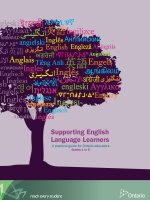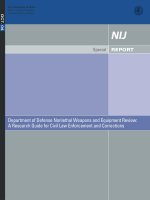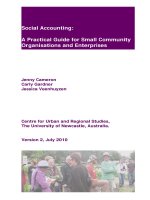Lean launchpad guide for educators teaching entrepreneurship and startup
Bạn đang xem bản rút gọn của tài liệu. Xem và tải ngay bản đầy đủ của tài liệu tại đây (1.86 MB, 12 trang )
Teaching with Urgency,
Without Teaching to the Test!
by Jen Jones – Hello Literacy
Session Handouts
North Carolina Reading Conference
March 17, 2015
Twitter
Handle:
@hellojenjones
Workshop
Hashtag:
#NCRA15
© 2015, Jen Jones Blog: helloliteracy.blogspot.com Store: hellojenjones.com Email:
_________________________________________________________________________________
_________________________________________________________________________________
_________________________________________________________________________________
_________________________________________________________________________________
_________________________________________________________________________________
_________________________________________________________________________________
_________________________________________________________________________________
_________________________________________________________________________________
_________________________________________________________________________________
_________________________________________________________________________________
_________________________________________________________________________________
_________________________________________________________________________________
_________________________________________________________________________________
_________________________________________________________________________________
_________________________________________________________________________________
_________________________________________________________________________________
_________________________________________________________________________________
_________________________________________________________________________________
_________________________________________________________________________________
_________________________________________________________________________________
_________________________________________________________________________________
_________________________________________________________________________________
_________________________________________________________________________________
_________________________________________________________________________________
_________________________________________________________________________________
_________________________________________________________________________________
_________________________________________________________________________________
_________________________________________________________________________________
_________________________________________________________________________________
_________________________________________________________________________________
Jen Jones | www.helloliteracy.blogspot.com | @hellojenjones
HOW the author is
saying it
WHAT the text means
What can I do when someone is annoying or
hurting me? Look the person in the eye and
say nicely:
I don’t like it when _____________________________.
I feel ________________when you_________________.
I would like_____________________________________.
When someone tells you this, what you can you
say back? Look the person in the eye and say
nicely:
I heard you say________________________________.
I won’t_________________________________________.
I am sorry. Debbie Miller, p.99
© 2015, Jen Jones
Mentor Text Titles: various nonfiction titles
Common Core Strategy Standards: RIT1.2, RIT.1
MINILESSON
PART
Language of the Reading Strategy Instruction
Mini-Lesson written by Jen Jones
Connection
(2 minutes)
Boys and Girls, I hear you have been learning about the world through books.
That is so exciting! I do the same thing. When I want to learn about the world, I
read books about the topics and things I want to learn about. Reading about the
world through books is just like real life, but in books.
Teaching
Point
(1 minute)
“Today, I want to teach you that readers can learn about the world by looking
at books and specifically by looking at the front of them closely to help figure out
what the book is going to teach you and to get your brain ready to read. One
way we do this is by looking at the cover and reading the title. First, we ask
“What is the title?” Then we ask “what are the pictures and the illustrations on
the cover of the book showing me?” Then, we ask “Does the title and the
pictures on the cover match? Finally, we ask, “Do I think I know what this book is
going to teach me?” When we ask and answer these questions, we can know the
book’s topic.Watch me as I ask these questions.
Teach
(4 minutes)
Listen to me as I think aloud while looking closely at the cover of these books.
First , “What is the title?” (Maps & Mapping)
Then, “What are the pictures on the cover showing me?” (a hand-drawn map)
Then, “Does the title and the cover picture match?” (yes)
Finally, “Do I know that this book is going to teach me? (all about maps)
Did you see how I asked and answered questions to figure out the topic.
Active
Engagement
(2 minutes)
Now it’s your turn to try it out.
I will read and stop so you can ask yourselves these questions. Then you will turn
and talk to your neighbor about:
what is the title? what is the cover picture showing me? do they match? do you
know what the book is going to teach you? Is that the topic?
I noticed you asked and answered these questions as you looked at the covers
carefully.
Link
(1 minute)
“Today we learned that readers can use information on the cover (the title and
the cover photo) to determine the book’s topic. One way we do this is by asking:
What is the title?
What is the cover picture showing me?
Does the title and the and cover picture match?
Do I know what the book is going to teach me?
Today and any day when you are reading nonfiction books about the world, you
now know that you can ask these questions to figure out the book’s topic. So,
when you go off to your reading places to read today you might ask these
questions too to get your brain ready to read.”
© 2015, Jen Jones
Mentor Text Title:
Common Core Strategy Standards:
MINILESSON
PART
Language of the Reading Strategy Instruction
Mini-lesson template shared with Jen Jones by Lea Mercantini-TCWRP
Connection
Teaching
Point
“Today, I want to teach you that readers…. so they can…. One way we do this is
by…. First, we… Then we…. Finally,….
Watch me as I…
Teach
Listen to me as I think aloud ….
First, …
Then, …
Then, …
Finally, ___ is …and we know this because…
Did you see how I….
Active
Engagement
Now it’s your turn to try it out
Link
“Today we learned that readers….so they can… One way we do this is by … First,
we… Then we… Finally, we…”
Today and any day when you are reading ___ books, you now know that you
can…. So, when you go off to your reading places to read today you might write
….
Guided Reading Lesson Plan © 2015, Hello Literacy
Guided Reading Lesson Plan (30 Minutes)
Min.
Text: Title & Level
3
Familiar
Reading
2
Fluency
Letters:
Sounds:
Words:
Phrases:
1
Mini-Lesson
Strategy
Reminder
Strategy from Minilesson:
1
New Text Reading
Brief Introduction:
3
Picture
Walk/Talk
Prior to reading the story, Ss should walk/talk through the book, page by
page, describing orally everything they see/think in each picture. “I see…”
or “I notice…” or “I think…”
8
New Text
Reading/Coaching
(stagger the passing out of books)
(listen in on students as they read, individually but at the same time and
coach individually on the run for structural errors, & after for errors that
don’t change the meaning of the story)
5
New Text
Discussion
Lower Level Questions:
Higher Level Questions:
2
New Text
Retelling
Turn to your neighbor and turn the pages to tell what happened on each
page, in your own words.
2
Word Work/
Vocabulary/
Language
3
Written
Comprehension
My Reading Block Planning Sheet
For the week of: _________________________
CMAPP Alignment Days: __________
CMAPP: Focus Objectives: ________________________________________________________
__________________________________________________________________________________
Weekly Focus: ____________________________________________________________________
Minilesson Focus
M
T
W
Th
F
Literacy Stations
Guided Reading
Rocks of Literacy: 1 2 3 4 5 6 7
Word Work (Spelling or Phonics)
Rocks of Literacy: 1 2 3 4 5 6 7
Research Project
Rocks of Literacy: 1 2 3 4 5 6 7
Vocabulary & Language
Rocks of Literacy: 1 2 3 4 5 6 7
Writing about Reading
Rocks of Literacy: 1 2 3 4 5 6 7
Independent/Partner Reading
Rocks of Literacy: 1 2 3 4 5 6 7
Early Finisher Independent Work:
2015, Jen Jones
2015, Hello Literacy
Teaching With Urgency? Answer these questions to reflect & find out.
What are students doing and why are they doing it?
Is there a sense of urgency about your teaching and the students' learning?
Do students know what it is they are supposed to be learning? And how and where have
you communicated this?
What percentage of the day are you talking and what percentage of the day are students
talking?
How regularly are you providing feedback to students, written or oral? And how regularly are
students providing you with feedback? (In his 2012 book, Visible Learning for Teachers, Hattie
claims that "the most powerful single influence enhancing achievement is feedback."
What percentage of the day are you reading to students and what percentage of the day
are students reading to themselves, to you, with each other or to each other?
How many minutes a day do students spend actually reading? (like "eyes on print" time as
Lucy would say)
Is the focus of your Guided Reading session aligned to the Teaching Point of your mini-
lesson?
Is your mini-lesson about 10 minutes? Or are you not aware of time and your mini-lesson turns
into a maxi-lesson?
Are students receiving solid, strategic, systematic, and explicit instruction in all of The Big
7 areas of ELA?
Are students getting an opportunity outside the Active Engagement section of your mini-
lesson, to practice and reinforce the skills and strategies taught in the mini-lesson? With
peers? With technology? With discussion? (and independently doesn't have to mean alone,
sitting and at a desk) Without being assessed on it yet or a grade taken for every practice
run?
Do students know what to do to solve a problem while you are teaching Guided Reading?
How many students are you reaching in a Guided Reading session (complexity, leveled or
strategy based groupings)? 1? 2? 4? 6? 8?
Are students receiving an intervention in a literacy area they are deficient in? Or are
students receiving Progress Monitoring every 10 or 20 days because DPI said so without
documentation of, or an actual intervention taking place?
NASA Picture of the Day
National Geographic Picture of the Day
Kodak Picture of the Day
FWA Photo of the Day
Zuma Picture of the Day
Earth Science Picture of the Day
Optics Picture of the Day
Radiology Picture of the Day
Historical Picture of the Day
Blog: helloliteracy.blogspot.com
Store: hellojenjones.com
Facebook: facebook.com/helloliteracy
Instagram: @hellojenjones
Slideshare: slideshare.net/hellojenjones
Pinterest: pinterest.com/hellojenjones
My #1 Best Seller!
Your Camera Roll









